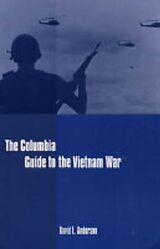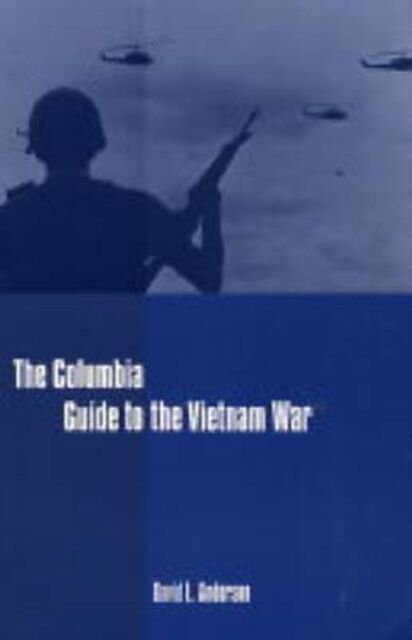The Columbia Guide to the Vietnam War
Einband:
Kartonierter Einband
EAN:
9780231114936
Untertitel:
Englisch
Genre:
Geschichte
Autor:
David Anderson
Herausgeber:
Columbia University Press
Anzahl Seiten:
352
Erscheinungsdatum:
21.04.2004
ISBN:
978-0-231-11493-6
Informationen zum Autor David L. Anderson Klappentext More than a quarter of a century after the last Marine Corps Huey left the American embassy in Saigon! the lessons and legacies of the most divisive war in twentieth-century American history are as hotly debated as ever. Why did successive administrations choose little-known Vietnam as the "test case" of American commitment in the fight against communism? Why were the "best and brightest" apparently blind to the illegitimacy of the state of South Vietnam? Would Kennedy have pulled out had he lived? And what lessons regarding American foreign policy emerged from the war? The Columbia Guide to the Vietnam War helps readers understand this tragic and complex conflict. The book contains both interpretive information and a wealth of facts in easy-to-find form. Part I provides a lucid narrative overview of contested issues and interpretations in Vietnam scholarship. Part II is a mini-encyclopedia with descriptions and analysis of individuals! events! groups! and military operations. Arranged alphabetically! this section enables readers to look up isolated facts and specialized terms. Part III is a chronology of key events. Part IV is an annotated guide to resources! including films! documentaries! CD-ROMs! and reliable Web sites. Part V contains excerpts from historical documents and statistical data. Zusammenfassung Offers an overview of contested issues and interpretations in Vietnam scholarship. This book provides descriptions and analysis of individuals! events! groups! and military operations. It contains excerpts from historical documents and statistical data. Inhaltsverzeichnis Part I: Historical Narrative1. Studying the Vietnam War2. Vietnam: Historical BackgroundRoots of the Vietnamese Culture and StateThe Impact of French ColonialismThe Rise of Vietnamese NationalismThe Origins of Vietnamese Communism3. United States: Historical BackgroundIdealism and Realism in U.S. Foreign RelationsThe United States and the Open Door in AsiaThe World Wars: The Legacies of Wilson and MunichThe Origins of the Cold War4. The French War in VietnamThe August RevolutionOutbreak of the Franco-Vietminh WarU.S. Support of FranceDienbienphu and the Geneva Conference5. The Diem Years: EisenhowerThe Decision to Back Ngo Dinh DiemThe Non-election of 1956The Illusion of Nation BuildingNLF: Rise of the Southern Insurgency6. The Diem Years: KennedyCounterinsurgency WarfareThe Buddhist CrisisThe Diem AssassinationWhat if Kennedy Had Lived?7. The American War in Vietnam: EscalationThe Gulf of Tonkin IncidentRolling ThunderJohnson Decides on a Land War in AsiaTheories of Causation8. The American War in Vietnam: StrategyThe DrafAttrition Strategy and Body CountHumpin' It: The American SoldierThe Air WarDiplomacyThe Resilient Enemy9. The American War in Vietnam: The Limits of PowerThe Tet offensiveThe Antiwar Movement and the MediaJohnson's Decision to Stop EscalationThe Presidential Election of 196810. The American War in Vietnam: De-escalationVietnamization and More BombingCambodia and Kent StateNegotiations and the Paris Peace AccordsDRV Victory in 197511. The War What Will Not Go AwayThe Postwar Wars in Southeast AsiaAmerican Vietnam VeteransFilms! Fiction! and PoetryPostmortemsPart II: The Vietnam War from A to ZPart III: ChronologyPart IV: Resource Guide ...
Autorentext
David L. Anderson
Klappentext
More than a quarter of a century after the last Marine Corps Huey left the American embassy in Saigon, the lessons and legacies of the most divisive war in twentieth-century American history are as hotly debated as ever. Why did successive administrations choose little-known Vietnam as the "test case" of American commitment in the fight against communism? Why were the "best and brightest" apparently blind to the illegitimacy of the state of South Vietnam? Would Kennedy have pulled out had he lived? And what lessons regarding American foreign policy emerged from the war? The Columbia Guide to the Vietnam War helps readers understand this tragic and complex conflict. The book contains both interpretive information and a wealth of facts in easy-to-find form. Part I provides a lucid narrative overview of contested issues and interpretations in Vietnam scholarship. Part II is a mini-encyclopedia with descriptions and analysis of individuals, events, groups, and military operations. Arranged alphabetically, this section enables readers to look up isolated facts and specialized terms. Part III is a chronology of key events. Part IV is an annotated guide to resources, including films, documentaries, CD-ROMs, and reliable Web sites. Part V contains excerpts from historical documents and statistical data.
Zusammenfassung
Offers an overview of contested issues and interpretations in Vietnam scholarship. This book provides descriptions and analysis of individuals, events, groups, and military operations. It contains excerpts from historical documents and statistical data.
Inhalt
Part I: Historical Narrative 1. Studying the Vietnam War 2. Vietnam: Historical Background Roots of the Vietnamese Culture and State The Impact of French Colonialism The Rise of Vietnamese Nationalism The Origins of Vietnamese Communism 3. United States: Historical Background Idealism and Realism in U.S. Foreign Relations The United States and the Open Door in Asia The World Wars: The Legacies of Wilson and Munich The Origins of the Cold War 4. The French War in Vietnam The August Revolution Outbreak of the Franco-Vietminh War U.S. Support of France Dienbienphu and the Geneva Conference 5. The Diem Years: Eisenhower The Decision to Back Ngo Dinh Diem The Non-election of 1956 The Illusion of Nation Building NLF: Rise of the Southern Insurgency 6. The Diem Years: Kennedy Counterinsurgency Warfare The Buddhist Crisis The Diem Assassination What if Kennedy Had Lived? 7. The American War in Vietnam: Escalation The Gulf of Tonkin Incident Rolling Thunder Johnson Decides on a Land War in Asia Theories of Causation 8. The American War in Vietnam: Strategy The Draf Attrition Strategy and Body Count Humpin' It: The American Soldier The Air War Diplomacy The Resilient Enemy 9. The American War in Vietnam: The Limits of Power The Tet offensive The Antiwar Movement and the Media Johnson's Decision to Stop Escalation The Presidential Election of 1968 10. The American War in Vietnam: De-escalation Vietnamization and More Bombing Cambodia and Kent State Negotiations and the Paris Peace Accords DRV Victory in 1975 11. The War What Will Not Go Away The Postwar Wars in Southeast Asia American Vietnam Veterans Films, Fiction, and Poetry Postmortems Part II: The Vietnam War from A to Z Part III: Chronology Part IV: Resource Guide

Leider konnten wir für diesen Artikel keine Preise ermitteln ...
billigbuch.ch sucht jetzt für Sie die besten Angebote ...
Die aktuellen Verkaufspreise von 6 Onlineshops werden in Realtime abgefragt.
Sie können das gewünschte Produkt anschliessend direkt beim Anbieter Ihrer Wahl bestellen.
Loading...
Die aktuellen Verkaufspreise von 6 Onlineshops werden in Realtime abgefragt.
Sie können das gewünschte Produkt anschliessend direkt beim Anbieter Ihrer Wahl bestellen.
| # | Onlineshop | Preis CHF | Versand CHF | Total CHF | ||
|---|---|---|---|---|---|---|
| 1 | Seller | 0.00 | 0.00 | 0.00 |
